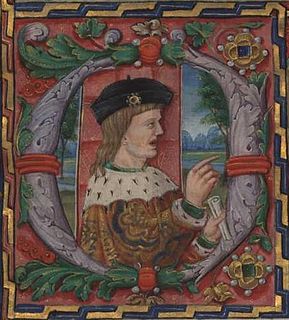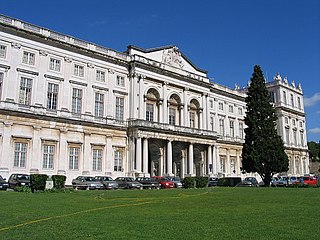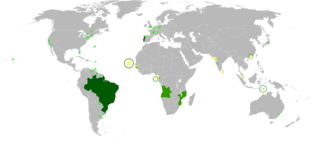Nossa Senhora do Pópulo is a former civil parish in the municipality of Caldas da Rainha, Portugal. In 2013, the parish merged into the new parish Caldas da Rainha — Nossa Senhora do Pópulo, Coto e São Gregório. The civil parish has an area of 12.00 square kilometres (4.63 sq mi) and had a population of 16,114 at the 2011 census.

The Camões Prize, named after Luís de Camões, is the most important prize for literature in the Portuguese language. It is awarded annually by the Portuguese Direcção-Geral do Livro e das Bibliotecas and the Brazilian Fundação Biblioteca Nacional to the author of an outstanding oeuvre of work written in Portuguese. The monetary award is of €100,000, making it among the richest literary prizes in the world.

The Supertaça Cândido de Oliveira is an annual Portuguese football match played since 1979 between the winners of the previous season's league and cup competitions. In the case that one team has won both competitions, then it will play again against the runners-up of the Taça de Portugal.

Military Police are a type of preventive state police of the states and of the Federal District of Brazil. The Military Police units, which have their own formations, rules and uniforms depending on the state and the Federal District, are responsible for maintaining public order across the country. Deployed solely to act as a deterrent against the commission of crime, units do not conduct criminal investigations. Detective work, forensics and prosecutions are undertaken by a state's Civil Police.

Adonias Aguiar Filho was a novelist, essayist, journalist, and literary critic from Bahia, Brazil, and a member of the Academia Brasileira de Letras.

The National Order of the Southern Cross is a Brazilian order of chivalry founded by Emperor Pedro I on 1 December 1822. This order was intended to commemorate the independence of Brazil and the coronation of Pedro I. The name derives from the geographical position of the country, under the constellation of the Southern Cross and also in memory of the name – Terra de Santa Cruz – given to Brazil at the time of European discovery.

The cédula de identidade is the official national identity document in Brazil. It is often informally called carteira de identidade, "RG" or simply identidade in Portuguese. The card contains the name, birthdate, parents' names, signature and thumbprint of the bearer. Other national documents can legally be used as an identity card, such as a federative unit-issued driver's license, passport or, for minors, a birth certificate. Each card has a unique RG number.
Diário da República (DR) is the official gazette of Portugal. Between 1869 and 1976, it was called Diário do Governo.

The Imprensa Nacional-Casa da Moeda, is the Portuguese mint and national press, owned by the Portuguese Government and administratively subordinated to the Portuguese Ministry of Finance. It is located in Lisbon in the São Mamede neighborhood.
Mass media of Portugal includes a variety of online, print, and broadcast formats, such as radio, television, newspapers, and magazines. In the 20th century the Portuguese government censored the media, until the "1976 constitution guaranteed freedom of the press."

Rodrigo Augusto da Silva, nicknamed "the diplomat", was a politician, diplomat, lawyer, monarchist and journalist of the Empire of Brazil. He is best known as the minister that authored and countersigned with Princess Isabel, then Princess Imperial Regent the law that ended slavery in Brazil. Rodrigo was born in São Paulo into a family of wealthy financiers. His father, the Baron of Tietê, was also a politician and leader of the conservative party in São Paulo.

Visitors to Brazil must obtain a visa from one of the Brazilian diplomatic missions, unless they come from one of the visa-exempt countries or countries eligible for an electronic visa.

Partido da Imprensa Golpista is a term used by left-wing Brazilian websurfers since 2007 to characterize an alleged attitude of the Brazilian mass media towards President Luiz Inácio Lula da Silva during the 2006 presidential election. The term was popularized by journalist Paulo Henrique Amorim in his blog. Whenever he uses the term, Amorim writes it with an "i" in lowercase as a pun with the name of the web portal "iG". where he was a journalist before he was dismissed on March 18, 2008, which he describes as a process of "ideological cleansing".

Portuguese customary units were used in Portugal, Brazil and other parts of the Portuguese Empire until the adoption of the metric system in the 19th century.

Hipólito José da Costa Pereira Furtado de Mendonça was a Brazilian journalist and diplomat considered to be the "father of Brazilian press".
The Protected Areas of the Azores are the basic administrative-territorial and conservation structures in the archipelago of the Azores and the surrounding oceans. The areas integrate the entirety of the Azores within its Exclusive Economic Zone, as well as the surrounding waters, under the international agreements and conventions. The network realizes the categorization of management for protected areas adopted by the International Union for Conservation of Nature (IUCN), adapting it to the specific geographical, environmental, cultural and political-administrative territory of the archipelago.

Comunidade Intermunicipal do Oeste is an administrative division of Portugal, located on the country's western central coast. The population in 2011 was 362,540, in an area of 2,220.16 km². Caldas da Rainha serves as the seat of OesteCIM.
Miguel Vicente de Abreu was a Goan historian, a minor official of the Imprensa Nacional. He belonged to the group of Goan intellectuals who were trained and sponsored by Cunha Rivara while he was the state secretary of State of Portuguese India.

The Direção-Geral do Património Cultural (DGPC), formerly the Instituto de Gestão do Património Arquitectónico e Arqueológico (IGESPAR) and Instituto Português do Património Arquitectónico (IPPAR, is a general directorate of the Government of Portugal tasked with the conservation, preservation, and inventory of Portuguese architectural heritage. This includes buildings and sites of historical, architectural, scientific or artistic value. The institute keeps a registry of all the classified sites and issues legally binding opinions regarding any works on them.
















